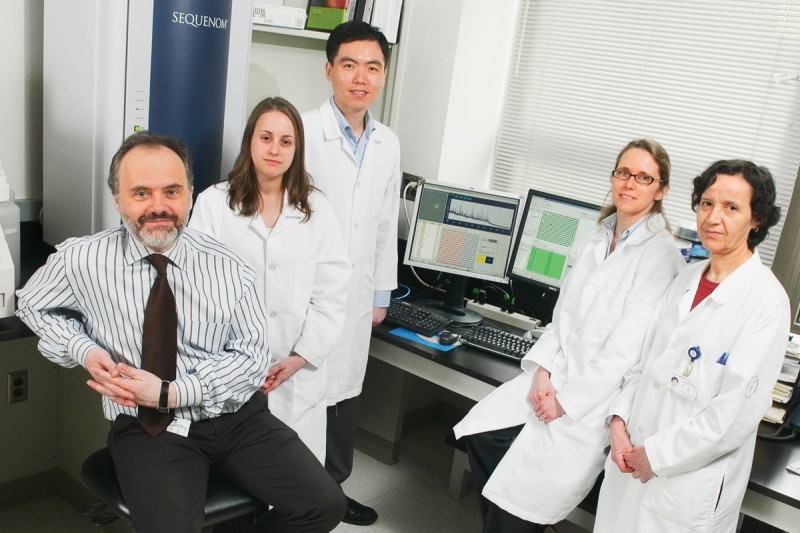
Staff involved in implementing the new technology for diagnosing gene mutations in tumors include (from left) Marc Ladanyi, Angela Marchetti, Chris Lau, Laetitia Borsu, and Khedoudja Nafa.
As the number of targeted cancer therapies grows, it is becoming increasingly important that hospital laboratories be able to perform timely and accurate genetic diagnostic tests on patients’ tumor samples. These tests allow pathologists to determine the gene mutations within each patient’s tumor cells so that oncologists can prescribe treatments that are most likely to be effective.
Now Memorial Sloan Kettering has made an important step forward in efficiently diagnosing gene mutations in patients’ cancers on an individual basis. The Center recently received approval from the New York State Department of Health to use a new, more sensitive and more efficient technology to look for mutations in the genes EGFR, KRAS, and BRAF in biopsy samples from patients with lung, colorectal, and thyroid cancers, as well as melanoma.
The test uses technology from a company called Sequenom. “To our knowledge, we are the only hospital to have New York State approval to use the Sequenom technology for this purpose,” explained Marc Ladanyi, Chief of the Molecular Diagnostics Service and Director of the Diagnostic Molecular Pathology Laboratory. Dr. Ladanyi led the Memorial Sloan Kettering team, including Laetitia Borsu, Chris Lau, and Khedoudja Nafa, that developed the protocols for and validated the performance characteristics of this new clinical application of Sequenom technology. Angela Marchetti will be the lead technologist for clinical testing.
In patients with certain types of cancer, the presence or absence of specific genetic mutations determines which therapies they are likely to respond to and, therefore, should receive. Knowing as much as possible about the genetic makeup of tumors helps ensure that patients get the treatments most likely to help them, while avoiding drugs that will not benefit them and the side effects that can accompany those drugs.
For example, lung cancer patients with mutations in the gene EGFR can be treated with the drug erlotinib (Tarceva®), which targets the product of the mutated gene. However, if patients instead have a mutation in the gene KRAS, they will not respond to the drug. In colorectal cancer, patients with mutations in KRAS and BRAF do not respond to the drugs cetuximab (Erbitux®) and panitumumab (Vectibix®), both of which also target the EGFR protein. In melanoma, patients whose tumors contain mutations in BRAF have recently been shown to respond well to a new BRAF inhibitor currently in clinical trials.
Memorial Sloan Kettering has been at the forefront of testing for these mutations, starting with EGFR mutation testing in 2004, using then-standard DNA testing approaches.
“There’s really been an evolution in molecular diagnostics,” Dr. Ladanyi said. “We are moving from tests that are very labor intensive to tests that can be done in an automated, high-throughput manner. In addition, this new testing technology can provide results more quickly, as well as look for multiple mutations at the same time, something the old tests could not do.”
Dr. Ladanyi added that the new technology also is more sensitive, allowing pathologists to perform molecular testing on biopsy samples that contain fewer tumor cells than what was required with the previous approaches. “This is important especially for patients who have already received therapy,” he explained. “Treatments can cause a lot of inflammation in the tumor, and then immune cells and other normal cells can outnumber the actual tumor cells. It’s also important in cancers where tumor cells are infiltrating connective tissue. This sensitivity and the ability to work with smaller tumor samples should make molecular diagnostic testing possible in cases where it was not before.”
“The Sequenom technology brings personalized medicine right into the mainstream of our colorectal cancer program,” said Leonard Saltz, co-leader of the colorectal disease management team. “We have known for a long time that colorectal cancer is a conglomerate of many diseases that all look roughly the same but have different genetic mutations. Now we will be able to break it down into patients with specific mutations in their tumors and target their therapies specifically at those mutations.”
In addition to testing for mutations in the EGFR, KRAS, and BRAF genes, the new technology will enable investigators to look for mutations in other, less-well-known genes and to enroll patients in clinical trials for new, experimental therapies targeted at those genes.
“Not only will we be able to rapidly get the full mutational profile that helps us with decisions on the use of standard chemotherapies, but we can now have a much broader mutational profile on each patient’s tumor, so that we can offer experimental treatment options to those patients who have a particular profile for which an experimental drug is likely to be effective,” Dr. Saltz added. “Some of these profiles are relatively rare; but by screening everyone, we expect to be able to identify which patients are most likely to benefit from one particular research option versus another.”
